Analysis of Subjectivity and Performativity in Cultural Context
VerifiedAdded on 2022/09/18
|6
|1340
|19
Essay
AI Summary
This essay delves into the concepts of subjectivity and performativity, examining their roles in shaping cultural identity. It begins by defining subjectivity as an individual's unique experience of the world, contrasting it with objectivity. The essay then explores how humanism views subjectivity, emphasizing free will and individual choices. It analyzes quotes from Lady Gaga, Post Malone, and Chris Pratt to illustrate the importance of embracing one's subjective reality. The essay further discusses performativity as a language for social action, drawing on the work of John L. Austin and Judith Butler. It explains how performativity challenges the notion that identity is innate, emphasizing instead that identity is constructed through actions and symbolic communication. The essay highlights Butler's theory of performativity and its influence by philosophers like Louis Althusser and Michel Foucault, and then connects the ideas of Butler and Erving Goffman to show how identity is a performance. Finally, it concludes that when performers like Gaga, Malone, and Pratt emphasize the need to embrace the self, it creates an identity through their actions of performativity.
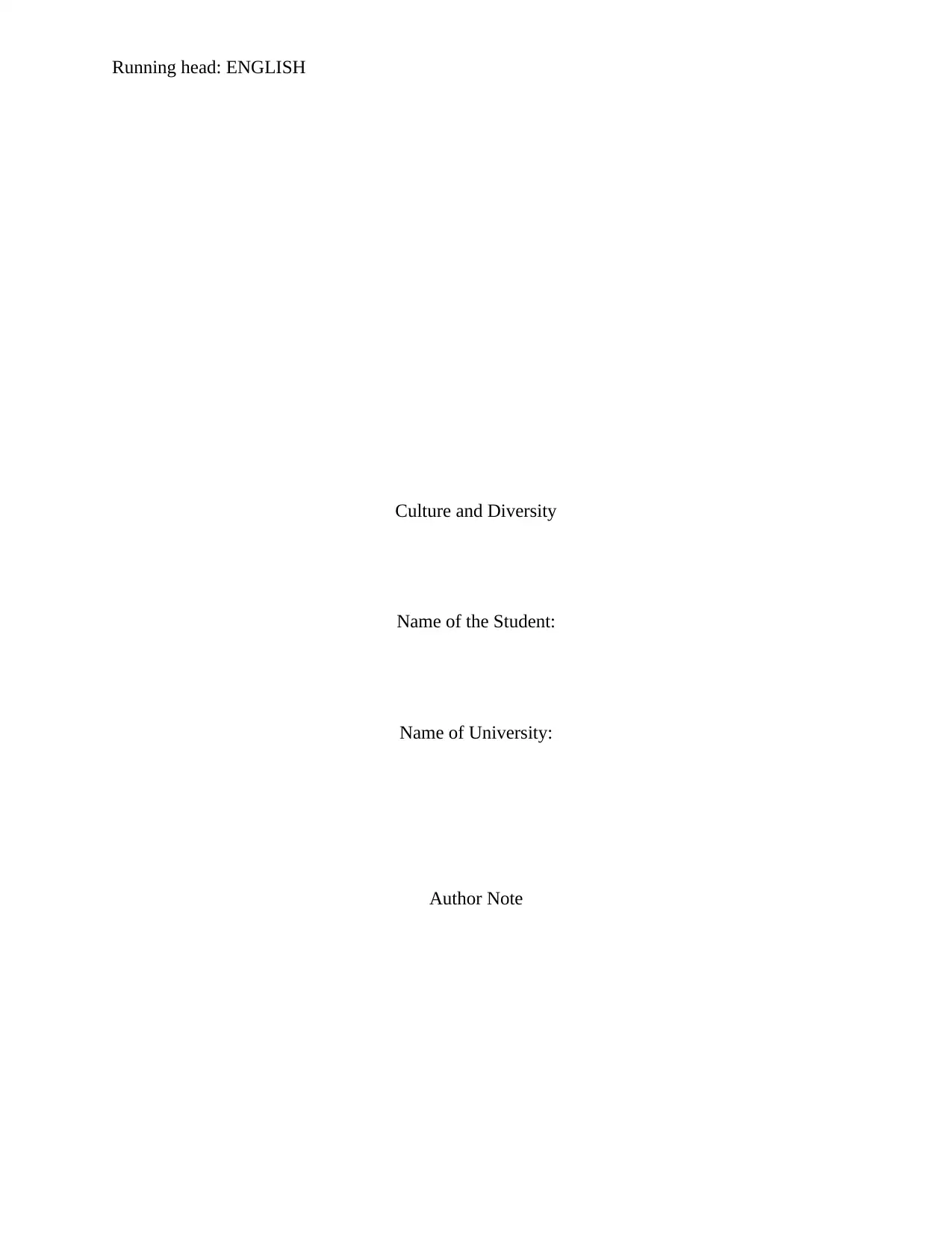
Running head: ENGLISH
Culture and Diversity
Name of the Student:
Name of University:
Author Note
Culture and Diversity
Name of the Student:
Name of University:
Author Note
Paraphrase This Document
Need a fresh take? Get an instant paraphrase of this document with our AI Paraphraser
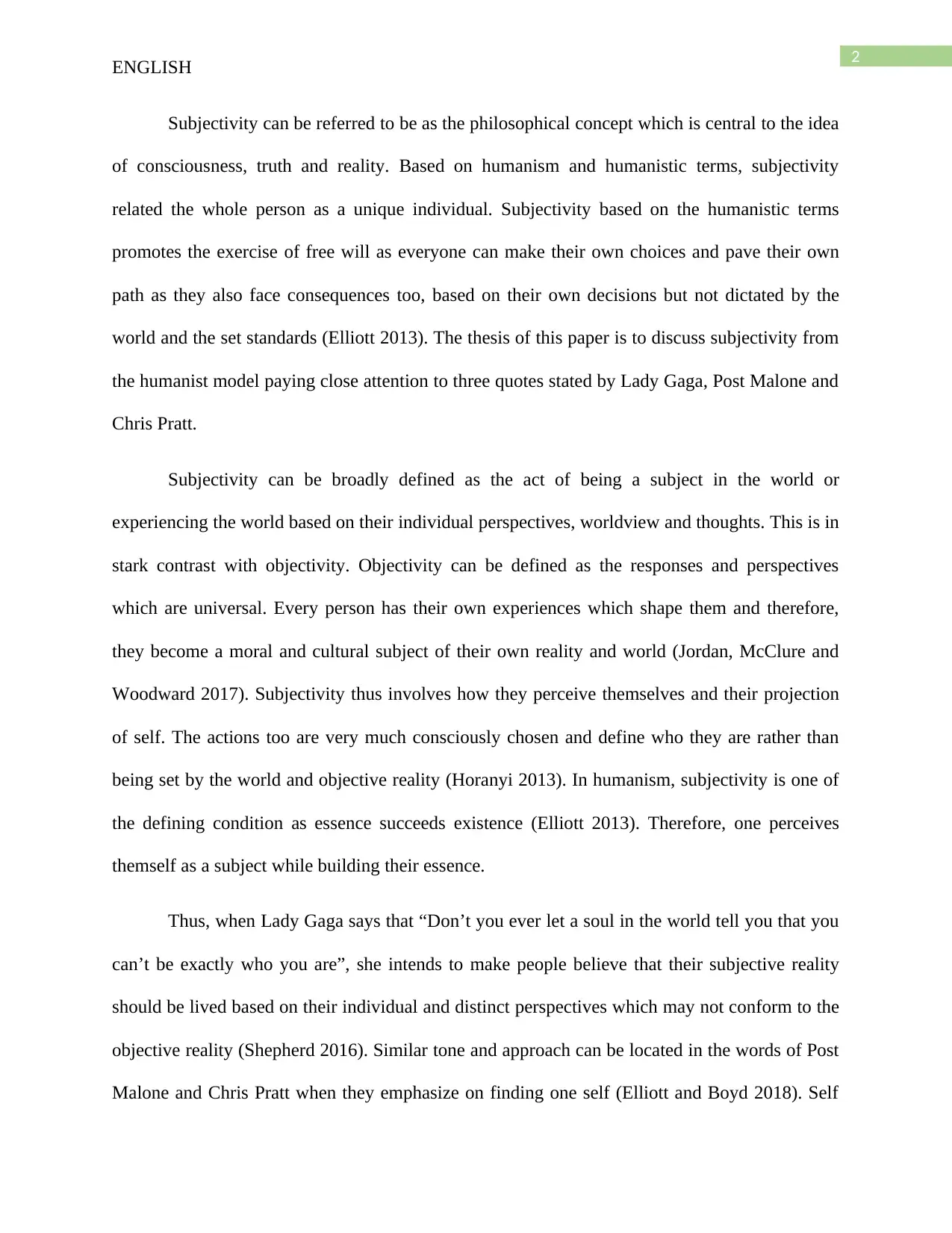
2
ENGLISH
Subjectivity can be referred to be as the philosophical concept which is central to the idea
of consciousness, truth and reality. Based on humanism and humanistic terms, subjectivity
related the whole person as a unique individual. Subjectivity based on the humanistic terms
promotes the exercise of free will as everyone can make their own choices and pave their own
path as they also face consequences too, based on their own decisions but not dictated by the
world and the set standards (Elliott 2013). The thesis of this paper is to discuss subjectivity from
the humanist model paying close attention to three quotes stated by Lady Gaga, Post Malone and
Chris Pratt.
Subjectivity can be broadly defined as the act of being a subject in the world or
experiencing the world based on their individual perspectives, worldview and thoughts. This is in
stark contrast with objectivity. Objectivity can be defined as the responses and perspectives
which are universal. Every person has their own experiences which shape them and therefore,
they become a moral and cultural subject of their own reality and world (Jordan, McClure and
Woodward 2017). Subjectivity thus involves how they perceive themselves and their projection
of self. The actions too are very much consciously chosen and define who they are rather than
being set by the world and objective reality (Horanyi 2013). In humanism, subjectivity is one of
the defining condition as essence succeeds existence (Elliott 2013). Therefore, one perceives
themself as a subject while building their essence.
Thus, when Lady Gaga says that “Don’t you ever let a soul in the world tell you that you
can’t be exactly who you are”, she intends to make people believe that their subjective reality
should be lived based on their individual and distinct perspectives which may not conform to the
objective reality (Shepherd 2016). Similar tone and approach can be located in the words of Post
Malone and Chris Pratt when they emphasize on finding one self (Elliott and Boyd 2018). Self
ENGLISH
Subjectivity can be referred to be as the philosophical concept which is central to the idea
of consciousness, truth and reality. Based on humanism and humanistic terms, subjectivity
related the whole person as a unique individual. Subjectivity based on the humanistic terms
promotes the exercise of free will as everyone can make their own choices and pave their own
path as they also face consequences too, based on their own decisions but not dictated by the
world and the set standards (Elliott 2013). The thesis of this paper is to discuss subjectivity from
the humanist model paying close attention to three quotes stated by Lady Gaga, Post Malone and
Chris Pratt.
Subjectivity can be broadly defined as the act of being a subject in the world or
experiencing the world based on their individual perspectives, worldview and thoughts. This is in
stark contrast with objectivity. Objectivity can be defined as the responses and perspectives
which are universal. Every person has their own experiences which shape them and therefore,
they become a moral and cultural subject of their own reality and world (Jordan, McClure and
Woodward 2017). Subjectivity thus involves how they perceive themselves and their projection
of self. The actions too are very much consciously chosen and define who they are rather than
being set by the world and objective reality (Horanyi 2013). In humanism, subjectivity is one of
the defining condition as essence succeeds existence (Elliott 2013). Therefore, one perceives
themself as a subject while building their essence.
Thus, when Lady Gaga says that “Don’t you ever let a soul in the world tell you that you
can’t be exactly who you are”, she intends to make people believe that their subjective reality
should be lived based on their individual and distinct perspectives which may not conform to the
objective reality (Shepherd 2016). Similar tone and approach can be located in the words of Post
Malone and Chris Pratt when they emphasize on finding one self (Elliott and Boyd 2018). Self
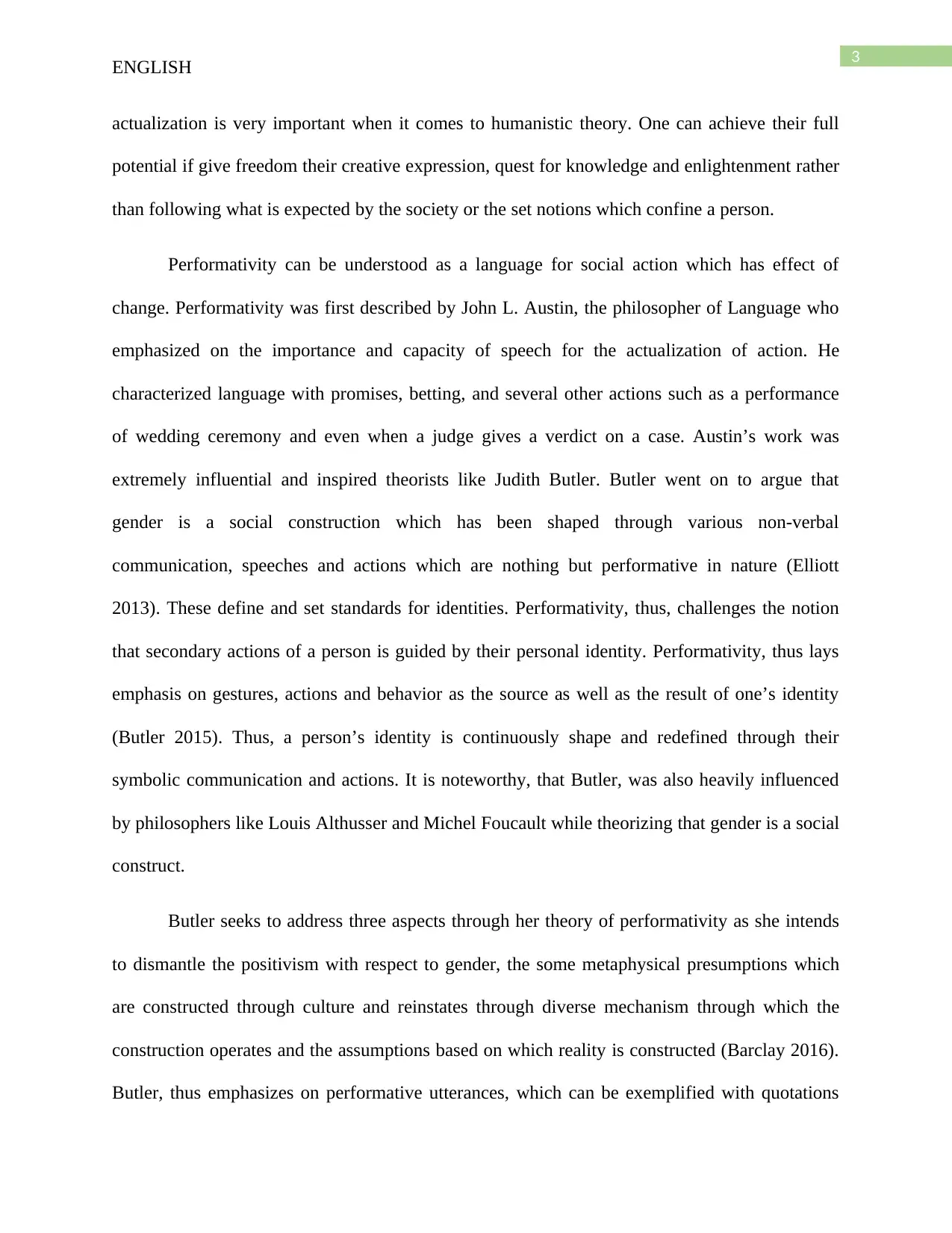
3
ENGLISH
actualization is very important when it comes to humanistic theory. One can achieve their full
potential if give freedom their creative expression, quest for knowledge and enlightenment rather
than following what is expected by the society or the set notions which confine a person.
Performativity can be understood as a language for social action which has effect of
change. Performativity was first described by John L. Austin, the philosopher of Language who
emphasized on the importance and capacity of speech for the actualization of action. He
characterized language with promises, betting, and several other actions such as a performance
of wedding ceremony and even when a judge gives a verdict on a case. Austin’s work was
extremely influential and inspired theorists like Judith Butler. Butler went on to argue that
gender is a social construction which has been shaped through various non-verbal
communication, speeches and actions which are nothing but performative in nature (Elliott
2013). These define and set standards for identities. Performativity, thus, challenges the notion
that secondary actions of a person is guided by their personal identity. Performativity, thus lays
emphasis on gestures, actions and behavior as the source as well as the result of one’s identity
(Butler 2015). Thus, a person’s identity is continuously shape and redefined through their
symbolic communication and actions. It is noteworthy, that Butler, was also heavily influenced
by philosophers like Louis Althusser and Michel Foucault while theorizing that gender is a social
construct.
Butler seeks to address three aspects through her theory of performativity as she intends
to dismantle the positivism with respect to gender, the some metaphysical presumptions which
are constructed through culture and reinstates through diverse mechanism through which the
construction operates and the assumptions based on which reality is constructed (Barclay 2016).
Butler, thus emphasizes on performative utterances, which can be exemplified with quotations
ENGLISH
actualization is very important when it comes to humanistic theory. One can achieve their full
potential if give freedom their creative expression, quest for knowledge and enlightenment rather
than following what is expected by the society or the set notions which confine a person.
Performativity can be understood as a language for social action which has effect of
change. Performativity was first described by John L. Austin, the philosopher of Language who
emphasized on the importance and capacity of speech for the actualization of action. He
characterized language with promises, betting, and several other actions such as a performance
of wedding ceremony and even when a judge gives a verdict on a case. Austin’s work was
extremely influential and inspired theorists like Judith Butler. Butler went on to argue that
gender is a social construction which has been shaped through various non-verbal
communication, speeches and actions which are nothing but performative in nature (Elliott
2013). These define and set standards for identities. Performativity, thus, challenges the notion
that secondary actions of a person is guided by their personal identity. Performativity, thus lays
emphasis on gestures, actions and behavior as the source as well as the result of one’s identity
(Butler 2015). Thus, a person’s identity is continuously shape and redefined through their
symbolic communication and actions. It is noteworthy, that Butler, was also heavily influenced
by philosophers like Louis Althusser and Michel Foucault while theorizing that gender is a social
construct.
Butler seeks to address three aspects through her theory of performativity as she intends
to dismantle the positivism with respect to gender, the some metaphysical presumptions which
are constructed through culture and reinstates through diverse mechanism through which the
construction operates and the assumptions based on which reality is constructed (Barclay 2016).
Butler, thus emphasizes on performative utterances, which can be exemplified with quotations
⊘ This is a preview!⊘
Do you want full access?
Subscribe today to unlock all pages.

Trusted by 1+ million students worldwide
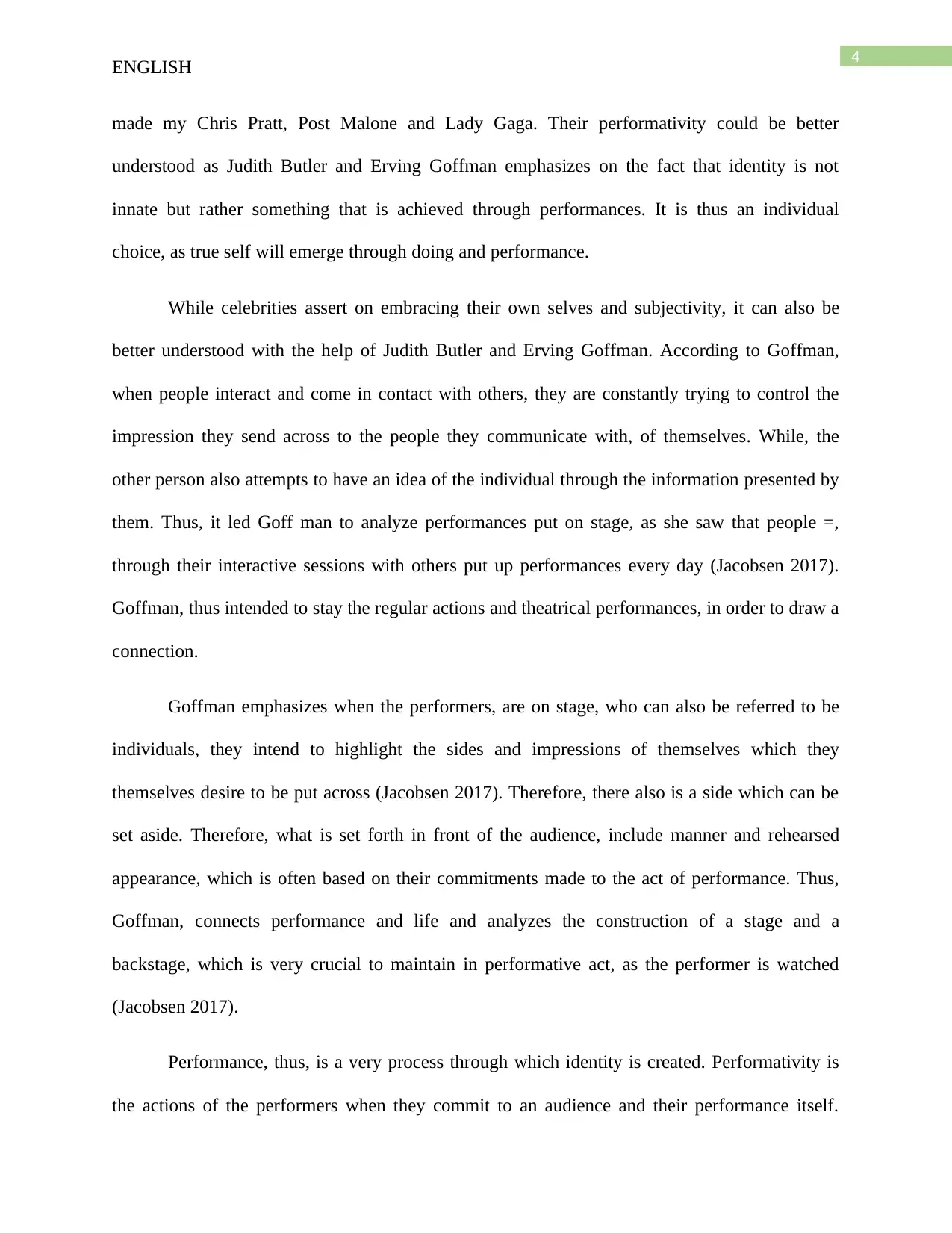
4
ENGLISH
made my Chris Pratt, Post Malone and Lady Gaga. Their performativity could be better
understood as Judith Butler and Erving Goffman emphasizes on the fact that identity is not
innate but rather something that is achieved through performances. It is thus an individual
choice, as true self will emerge through doing and performance.
While celebrities assert on embracing their own selves and subjectivity, it can also be
better understood with the help of Judith Butler and Erving Goffman. According to Goffman,
when people interact and come in contact with others, they are constantly trying to control the
impression they send across to the people they communicate with, of themselves. While, the
other person also attempts to have an idea of the individual through the information presented by
them. Thus, it led Goff man to analyze performances put on stage, as she saw that people =,
through their interactive sessions with others put up performances every day (Jacobsen 2017).
Goffman, thus intended to stay the regular actions and theatrical performances, in order to draw a
connection.
Goffman emphasizes when the performers, are on stage, who can also be referred to be
individuals, they intend to highlight the sides and impressions of themselves which they
themselves desire to be put across (Jacobsen 2017). Therefore, there also is a side which can be
set aside. Therefore, what is set forth in front of the audience, include manner and rehearsed
appearance, which is often based on their commitments made to the act of performance. Thus,
Goffman, connects performance and life and analyzes the construction of a stage and a
backstage, which is very crucial to maintain in performative act, as the performer is watched
(Jacobsen 2017).
Performance, thus, is a very process through which identity is created. Performativity is
the actions of the performers when they commit to an audience and their performance itself.
ENGLISH
made my Chris Pratt, Post Malone and Lady Gaga. Their performativity could be better
understood as Judith Butler and Erving Goffman emphasizes on the fact that identity is not
innate but rather something that is achieved through performances. It is thus an individual
choice, as true self will emerge through doing and performance.
While celebrities assert on embracing their own selves and subjectivity, it can also be
better understood with the help of Judith Butler and Erving Goffman. According to Goffman,
when people interact and come in contact with others, they are constantly trying to control the
impression they send across to the people they communicate with, of themselves. While, the
other person also attempts to have an idea of the individual through the information presented by
them. Thus, it led Goff man to analyze performances put on stage, as she saw that people =,
through their interactive sessions with others put up performances every day (Jacobsen 2017).
Goffman, thus intended to stay the regular actions and theatrical performances, in order to draw a
connection.
Goffman emphasizes when the performers, are on stage, who can also be referred to be
individuals, they intend to highlight the sides and impressions of themselves which they
themselves desire to be put across (Jacobsen 2017). Therefore, there also is a side which can be
set aside. Therefore, what is set forth in front of the audience, include manner and rehearsed
appearance, which is often based on their commitments made to the act of performance. Thus,
Goffman, connects performance and life and analyzes the construction of a stage and a
backstage, which is very crucial to maintain in performative act, as the performer is watched
(Jacobsen 2017).
Performance, thus, is a very process through which identity is created. Performativity is
the actions of the performers when they commit to an audience and their performance itself.
Paraphrase This Document
Need a fresh take? Get an instant paraphrase of this document with our AI Paraphraser

5
ENGLISH
When performers like Gaga, Malone and Chriss Pratt emphasizes on the need to embrace the
self, rather than conforming to the social mores and standards, it has an effect of change. This
creates an identity of the performers through their actions of performativity, such as speech and
gestures but here, their speech.
ENGLISH
When performers like Gaga, Malone and Chriss Pratt emphasizes on the need to embrace the
self, rather than conforming to the social mores and standards, it has an effect of change. This
creates an identity of the performers through their actions of performativity, such as speech and
gestures but here, their speech.
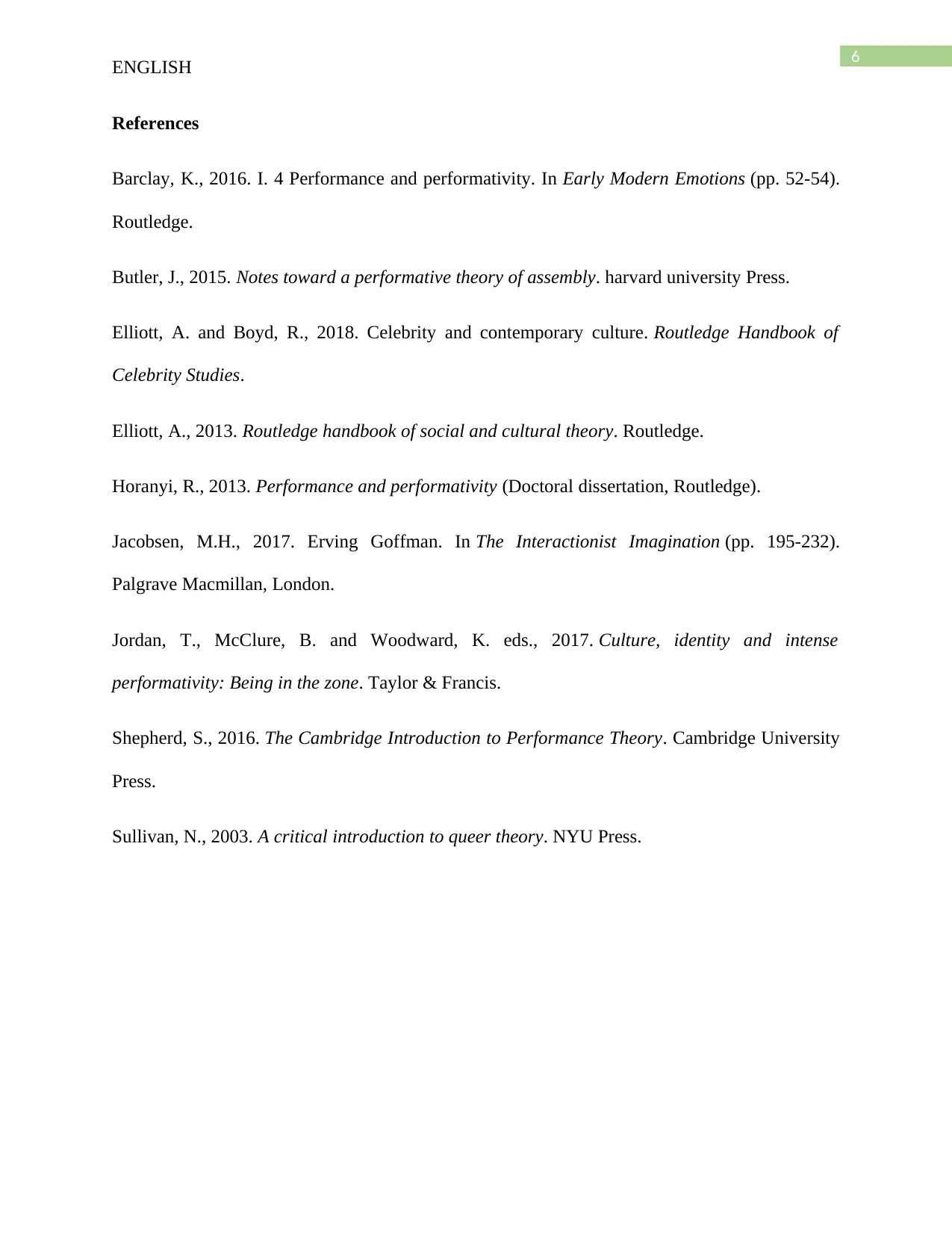
6
ENGLISH
References
Barclay, K., 2016. I. 4 Performance and performativity. In Early Modern Emotions (pp. 52-54).
Routledge.
Butler, J., 2015. Notes toward a performative theory of assembly. harvard university Press.
Elliott, A. and Boyd, R., 2018. Celebrity and contemporary culture. Routledge Handbook of
Celebrity Studies.
Elliott, A., 2013. Routledge handbook of social and cultural theory. Routledge.
Horanyi, R., 2013. Performance and performativity (Doctoral dissertation, Routledge).
Jacobsen, M.H., 2017. Erving Goffman. In The Interactionist Imagination (pp. 195-232).
Palgrave Macmillan, London.
Jordan, T., McClure, B. and Woodward, K. eds., 2017. Culture, identity and intense
performativity: Being in the zone. Taylor & Francis.
Shepherd, S., 2016. The Cambridge Introduction to Performance Theory. Cambridge University
Press.
Sullivan, N., 2003. A critical introduction to queer theory. NYU Press.
ENGLISH
References
Barclay, K., 2016. I. 4 Performance and performativity. In Early Modern Emotions (pp. 52-54).
Routledge.
Butler, J., 2015. Notes toward a performative theory of assembly. harvard university Press.
Elliott, A. and Boyd, R., 2018. Celebrity and contemporary culture. Routledge Handbook of
Celebrity Studies.
Elliott, A., 2013. Routledge handbook of social and cultural theory. Routledge.
Horanyi, R., 2013. Performance and performativity (Doctoral dissertation, Routledge).
Jacobsen, M.H., 2017. Erving Goffman. In The Interactionist Imagination (pp. 195-232).
Palgrave Macmillan, London.
Jordan, T., McClure, B. and Woodward, K. eds., 2017. Culture, identity and intense
performativity: Being in the zone. Taylor & Francis.
Shepherd, S., 2016. The Cambridge Introduction to Performance Theory. Cambridge University
Press.
Sullivan, N., 2003. A critical introduction to queer theory. NYU Press.
⊘ This is a preview!⊘
Do you want full access?
Subscribe today to unlock all pages.

Trusted by 1+ million students worldwide
1 out of 6
Your All-in-One AI-Powered Toolkit for Academic Success.
+13062052269
info@desklib.com
Available 24*7 on WhatsApp / Email
![[object Object]](/_next/static/media/star-bottom.7253800d.svg)
Unlock your academic potential
Copyright © 2020–2026 A2Z Services. All Rights Reserved. Developed and managed by ZUCOL.